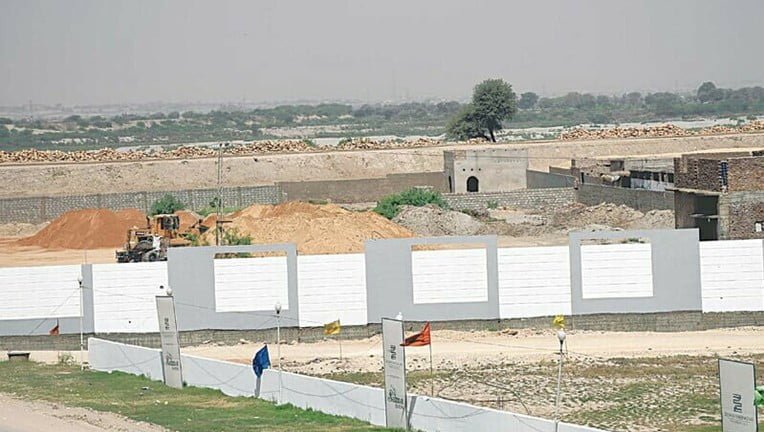The recent land scandal in Malakwal tehsil of Punjab’s Mandi Bahauddin district has once again exposed the insidious nexus between corrupt revenue department officials and greedy developers. Over 100 villagers have been swindled of their ancestral land, which has been transferred to the grandson of a powerful property tycoon through illegal means.
This flagrant violation of property rights has caused immense anguish to the affected villagers, who are unlikely to regain their land anytime soon. Despite the case being reported to the anti-corruption agency, it is doubtful if justice will be served. The accused are likely to get bail, and those with financial and political influence may escape scot-free.
Sadly, this is not an isolated incident but a symptom of a larger malaise that afflicts our society. The collusion between unscrupulous developers and corrupt officials is a well-known fact, and the most vulnerable members of society are often the worst affected. In this case, the villagers were not even aware that their land had been transferred until it was too late.
The situation is made worse by the slow pace of the legal system, which often favors the powerful and influential. For the villagers, justice may come at a heavy cost, as they are likely to be forced to accept paltry compensation for their lost land.
The gravity of the situation demands urgent action. The authorities must take strict measures to ensure that such incidents do not occur in the future. The revenue department officials involved in the scam must be held accountable, and the property tycoon’s grandson should be brought to justice.
Acquire our monthly English and Urdu magazine promptly by accessing the Daraz App hyperlink!
https://www.daraz.pk/shop/3lyw0kmd
Moreover, there is a need to overhaul the land registration process to make it more transparent and accountable. The government should establish a mechanism to verify land transactions and prevent fraudulent transfers. This will not only prevent similar scams in the future but also restore the confidence of people in the integrity of the land registration process.
The recent land scam in Punjab’s Mandi Bahauddin district is just the tip of the iceberg when it comes to the deep-rooted corruption and greed in Pakistan’s real estate sector. The scandal involved the illegal transfer of 125 acres of ancestral land from 100 villagers to the grandson of a powerful property tycoon through the connivance of corrupt revenue department officials. This is a stark reminder that the lawlessness and impunity in the real estate sector is a ticking time bomb waiting to explode.
Sadly, this is not an isolated case. Karachi and other parts of the country have witnessed similar incidents where land has been snatched from unsuspecting owners by unscrupulous builders. In some cases, the state has been an active accomplice in these land grabs. The government’s recent move to evict poor farmers and small business owners from their lands near Lahore for a riverfront development project is a case in point. This is happening despite opposition from environmentalists and urban planners who warn of the disastrous consequences of such schemes.
The underlying problem is the unbridled greed for land in Pakistan, which is driven by the massive profits involved in the real estate business. The sector’s ability to launder illegal cash further exacerbates the problem. Unless the government takes serious steps to curb the rampant corruption in the real estate sector and make it less lucrative, the poor will continue to be exploited and robbed of their livelihoods.
The irony is that land is a finite resource, but it is treated as a commodity to be bought and sold like any other. The lust for land has led to a host of problems, including environmental degradation, social injustice, and financial instability. It is time for Pakistan to wake up to the reality that the reckless pursuit of land is not sustainable in the long run.
One of the biggest challenges in curbing the corruption in the real estate sector is the nexus between builders, bureaucrats, and politicians. This unholy alliance has made it virtually impossible to enforce the rule of law and protect the rights of the citizens. The nexus works by manipulating the official land records, forging documents, and intimidating the owners. The victims of land scams are left to fend for themselves, while the culprits walk away with their ill-gotten gains.
The government must act decisively to break this nexus and bring the perpetrators to justice. This requires a multi-pronged approach that includes administrative reforms, legal and institutional changes, and awareness campaigns. The government needs to strengthen the anti-corruption agencies and empower them to take swift action against the corrupt officials and builders. It must also simplify the land registration process, digitize the land records, and make them accessible to the public.
Another important step is to promote alternative forms of investment that are less dependent on land speculation. The government can encourage investments in the manufacturing and service sectors by providing incentives and a conducive environment for business. This will create jobs and boost economic growth, reducing the pressure on the real estate sector.
In conclusion, the land scams in Pakistan are a symptom of a much deeper malaise in the society. The unchecked greed for land is a threat to the environment, social justice, and financial stability. The government must take bold steps to curb the corruption in the real estate sector and protect the rights of the citizens. It is time for Pakistan to shift its focus from land to people, and invest in human capital and sustainable development. Only then can we hope to build a better future for our children.
Read more:
















